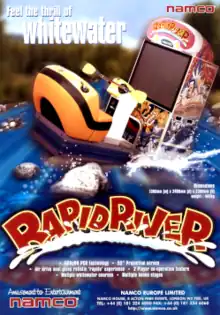| Rapid River | |
|---|---|
 | |
| Developer(s) | Namco |
| Publisher(s) | Namco |
| Platform(s) | Arcade |
| Release | |
| Genre(s) | Boating |
| Arcade system | Namco Gorgon |
Rapid River[lower-alpha 1] is a 1997 arcade game released by Namco. The game is about white water rafting, and players must race against the clock, passing through checkpoints to extend the time they have to complete the level. The game is notable for its unique player controls that aim to replicate oars.[2][3][4] It was intended to appeal to dating couples.[5] The game is one of only two known games to run on Namco Gorgon hardware,[6] an early revision of the Namco System 23 hardware. A virtual reality remake was released by Bandai Namco Amusement in 2018 for its VR Zone arcade centers.[7][8]
Gameplay
The cabinet includes a pneumatic system that jolts the raft seat whenever the player(s) collide into rocks and/or crash into big swells and a 50-inch screen. The raft seat accommodates up to two players who can act as a team to combine their strength and paddle away from hungry dinosaurs, deadly whirlpools and so on. Several branches or forks in the river allow players to choose their own course through the game and navigate to different areas. This aims to provide similar non-liner gameplay popularised by titles such as Sega's Outrun. There total 6 different themed areas of gameplay, including Dinosaur Land (with a T-Rex chasing the player's boat), Evening Along the Nile, and The Big Canyon.[9] If players successfully reach one of three different endings in time, they are given a special bonus stage.[2][10]
Reception
Rapid River was well received upon release as one of Namco's major titles at the 35th Japan Amusement Expo in Tokyo. Edge magazine called it "one of the most entertaining games of the show",[9] and Sega Saturn Magazine dubbed it "the game everyone was talking about", stating "incredible effects and amusing graphics ensured it's [sic] popularity".[4] Computer and Video Games named it as the biggest game at the show for Namco.[6] In Japan, Game Machine listed Rapid River on their January 1, 1998 issue as being the most-popular dedicated arcade game at the time.[14]
Notes
References
- ↑ Akagi, Masumi (13 October 2006). ナムコ(中村製作所)Namco; ら; Namco America; R (in Japanese) (1st ed.). Amusement News Agency. pp. 54, 102, 127, 162. ISBN 978-4990251215.
{{cite book}}:|work=ignored (help) - 1 2 "Rapid River". Killer List of Videogames. International Arcade Museum. 2020. Retrieved 2019-04-11.
- ↑ "Salon: Namco: le réalisme économique en attendant la PS 2... (JAMMA Show) - Rapid River". Consoles + (in French). No. 70. M.E.R.7. November 1997. p. 19.
- 1 2 "This Is JAMMA Hot!". Sega Saturn Magazine. No. 25. Emap International Limited. November 1997. p. 13. Retrieved December 3, 2019.
- ↑ Ogasawara, Ken; Mike, Major (January 1998). "The 1997 Amusement Machine Show: The Year of the Cobra". GamePro. No. 112. IDG. p. 48.
- 1 2 "JAMMA Show Report". Computer and Video Games. No. 193. EMAP. December 1997. pp. 22–24.
- ↑ Sato, Kazuya (7 September 2018). "VR ZONE新作「冒険川下りVR ラピッドリバー」を体験--酔いを防ぐ"左右の回転"". CNET Japan (in Japanese). CBS Interactive. Archived from the original on 8 September 2018. Retrieved 29 August 2020.
- ↑ "Bandai Namco's Mazaria Concept – October 2019 | RePlay Magazine". October 2019. Retrieved 2020-08-29.
- 1 2 "Cutting Edge - JAMMA: Konami Strikes with Cobra". Edge. No. 51. Future plc. October 1997. pp. 6–9.
- ↑ "Games, the final frontier". The Independent. 1997-11-30. Retrieved 2019-04-11.
- ↑ Weiss, Brett Alan (1998). "Rapid River - Review". AllGame. All Media Network. Archived from the original on 2014-11-15. Retrieved 2020-08-29.
- ↑ Seddiki, Reyda; Pottier, Christophe (April 1998). "L'arcade dépasse les bornes! - Rapid River (Namco)". Player One (in French). No. 85. Média Système Édition. p. 34.
- ↑ Karels, Ralph (August 2000). "Arcade-Special: Im Reich der Münzfresser - díe Arcade aud dem Prüfstand — Rapid River". Video Games (in German). No. 105. Future-Verlag. p. 37.
- ↑ "Game Machine's Best Hit Games 25 - 完成品夕イプのTVゲーム機 (Dedicated Videos)". Game Machine (in Japanese). No. 556. Amusement Press, Inc. 1 January 1998. p. 37.